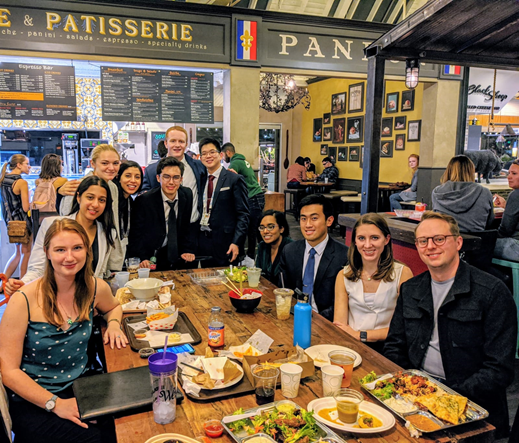The semester has flown by with only a month left to wrap everything up! I feel like there is so much to do and a month isn’t nearly enough time to finish all of my projects and assignments. Currently, I am applying to PhD programs and the deadline for most schools is fast approaching in December. It has been hard to balance applications with my GMI projects the past few months, but it has been good practice in time management skills. I feel like this program has prepared me very well for my next career move, and I am happy that I pursued it instead of jumping straight into a job.
For my local project - Luc, Sanjana, Katherine, and I are working on developing a device to treat air leaks that can occur in the lungs after thoracic surgeries. We are backed by CDI at the Texas Medical Center and collaborating with surgeons at MD Anderson to solve this problem. This need did not originate through observations like many of the other needs. Instead it came about through conversations with physicians, who said it was a hug problem that did not currently have a satisfactory solution. After hearing this, I did further research and read over 100 articles about it until I was an expert in all things air leaks. I realized it was a huge need and in 3 days, I created a presentation to win over CDI and gain their support to back this need.
I am very happy that me and my team are able to pursue this need because, unlike the other needs, I am very passionate about this one and I genuinely think we can design a device that could improve the current standard of care. Prolonged air leaks (PAL) are classified as leaks that persist 5 days post-surgery and they are the most common complication of thoracic surgery with rates as high at 30%. The current standard of care it to simply monitor the patient, which is costly since they take up hospital rooms; and even then 20% of patients with PAL will need further treatment. The current treatment options for PAL are inefficient, too costly, or have high complication rates, and some of the weaker patients cannot undergo these treatment options anyway. This makes treating PAL a very desirable market to move into.
For my global project - Aedan, Matt, and I are working with Dr. Kevin McHugh, a Rice bioengineering professor, to design a microneedle transdermal delivery system that can be used to deliver vaccines in low-resource settings. Our original project was working with Hospital De Amor in Brazil to find a way to reduce radiation exposure to radiopharmacists in the nuclear medicine department. While talking to stakeholders in the medical center, however, we found that this problem was not validated and that exposure levels reported in Brazil were well below the international standard. Because of this, we ended up closing that project and began working with Dr McHugh. Our main focus is on combining Dr. McHugh’s controlled-release microparticles with a microneedle patch to eliminate the need for multiple rounds of vaccines in low-resource settings. This project is novel as no one has ever combined the two before, and so me and my team are very excited to take it on!

